By definition, an aristocrat is a member of a "government by the best individuals or by a small privileged class." The chops-heavy trio of guitarist Guthrie Govan, bassist Bryan Beller, and drummer Marco Minnemann could be easily voted into office if the main issues were musicality, a progressive approach to instrumentals, and overall ability to create face-melting solos.
With Culture Clash, the group members (now with some road time under their belts) sound more comfortable and more willing to trust each other musically. " We're happier with this album,” Beller says. “The material, we feel, is more cohesive as a band. We like the sound of it better. The first one was done so quickly we didn't really know what we had on our hands because we were such a new band." Although this album wasn't recorded at a leisurely pace, it was recorded with a focus and a level of comfort that was missing from the Aristocrats’ self-titled debut.
"Spending some time on the road gives you a heightened sense of freedom. The idea that you can really write whatever you want," Govan mentions. With three virtuoso musicians, the urge to push the boundaries—not only technically, but also stylistically—can be hard to resist. "It could be as difficult as you want, or as silly as you want, or come from any absurd stylistic starting point,” Govan continues. “It will still sound like this band by the time we finish with it." We caught up with Govan and Beller after the opening night of their summer tour to discuss their approach to composition, working out some hellbilly riffs, and if they’ve ever wrote something that was too hard.
How did the sessions differ from the first album?
Beller: Honestly, it was about our surroundings. First of all, we worked with a comfortable, familiar engineer, someone I have done three or four records with and he mixed our first record, although he didn't record it. Second, we did it in Nashville, where I live, as opposed to all of us meeting in Chicago. I had the home-base advantage, I feel comfortable there, and I can have people staying at my house. Then there's the aspect that Guthrie, Marco, and I all knew each other better for this second record. Even though we had the same amount of time, it didn't feel nearly as frenzied when we were in the studio. The first one was just crazy.
How did the last tour help in developing your group rapport for this album?
Govan: More than anything else, it gives you a heightened sense of freedom. The idea that you can really write whatever you want. It could be as difficult as you want, or as silly as you want, or come from any absurd stylistic starting point. It will still sound like this band by the time we finish with it. I think the strength of our personalities and how we interact with each other is such a big part of the sound. It doesn't have to be genre specific or anything like that.
Was the pre-production process particularly challenging considering your busy schedules as sidemen?
Govan: If you have my life, you don't really have the luxury of setting aside time. It's more like "When do you eat?" When you're on tour, you eat when food presents itself. When you write, and there's a window, you have to seize it. I certainly had a very, very hectic period in my life going on while we were trying to write material. To some extent, I had to force myself when I saw a window of opportunity whether I liked it or not. The good element of that is that my contributions were all completely fresh and written specifically for this band, apart from the two-bar riff in "Culture Clash," which I’d been sitting on for a couple of years and didn't know what to do with. It was helpful to me to now have some idea of what this band sounds like and what everyone's strengths are and be able to imagine roughly what kind of thing would sound good when we got together and played it.
Beller: I actually wrote a song about how difficult it was to find time to write the songs for the record. That's what "Living the Dream" is about. I require time at home away from everyone else. I can't really write on the road. Well, it's not that I can't, it's just more difficult to do it. I wrote a little bit of "Cocktail Umbrellas" while on the road but it's much easier for me to do it at home.
When you present the demos to the other band members, how much are the arrangements fleshed out?
Beller: There's tweaking, but I wouldn't say there's too many changes to the arrangement. The songs are arranged when we come in. The form is pretty set. Now, tone, stylistic things, and being individual musicians who can put their stamp on it, that all comes in the studio just by the nature of being who we are. We produce our own songs, so on Marco's tunes he's in there asking for a little more of this or that—same thing with Guthrie. Everybody has a unique style of doing it, which is interesting.
Guthrie, how did the title track evolve? The counterpoint intro is particularly interesting.
Govan: The whole theme of that song is that guitar riff at the beginning. Some version of that is running through a sizeable percentage of the tune. The general idea was to have jarring and very different contexts for that riff to appear in. It was kind of a loose hint to the term "Culture Clash." Almost like this riff going to different countries and experiencing different things. The more Hendrix-sounding, funky version of that riff was probably the starting point. Then you could probably imagine from that if you're trying to make that riff different you might try a more muted, clean tone thing. The bass counterpoint seemed like a good way to start it because it seemed like it would confuse people. I don't think that bass part really makes any sense on its own. If you remove the guitar track from that you think, "Why is the bass playing in those places?" Quite counter-intuitive, I hope. But put the two together and you get this interweaving. Later on in the song, the idea was that the riff would reveal itself in a more obvious fashion. The guitar part is definitely the backbone of the tune.
When you're working on a tune, do the guitar and bass parts come simultaneously?
Govan: Usually, these days I try to write the bass and guitar parts concurrently. So I will sit there in my grubby little room swapping between guitar and bass on a four-bar basis and let the two parts affect each other. I'll think, "Now that the bass part is doing this, does the guitar need to do that?" Then I'll go back to the guitar and play a different version. Bass lines are quite a big part of what makes a tune work for me. I've never been one of those people who write a self-contained guitar melody and then make the bass plug through root notes. I love the idea that the bass can be melodic as well. Just listen to James Jamerson or Paul McCartney and you will hear how melodic a bass part can be. It doesn't just have to add meat. I try to do some of these things.
"I think the strength of our personalities and how we interact with each other is such a big part of the sound,” says Govan. “It doesn't have to be genre specific or anything like that. Photo by Sean Molin
Bryan, what did you use to get that synth sound on the intro to "Dance of the Aristocrats?"
Beller: The main synth filter sound you hear is a regular bass guitar through a SWR Mo Bass. It's an amplifier with built-in effects and I was using the bassynth effect. It's a true analog filter. It just sounds really great. It's impractical to travel with that head, so I can't bring it with me everywhere, unfortunately. But I have an Electro-Harmonix Bass Micro Synthesizer that I use when I play that tune live and I combine that with the SWR Mo Bass to make the sound that you hear on the record.
Did Marco have that sound in mind when he brought in that tune?
Beller: You know what, the amazing thing about Marco is that he’s a complete multi-instrumentalist. He plays every instrument and is capable of producing a fully formed, very mature demo. I mean he's put out like 15 records of his own where he plays almost all the instruments. Of course, the intention of the song is there but it really comes to life when we play each other's music. That said, in this song it was a keyboard synth on the demo.
Let's move onto gear. Guthrie, are you still playing the Charvel prototype #2 that we saw you with on the Steven Wilson tour?
Govan: Interestingly, I am now playing prototype #3, which turned up yesterday. These guys really care when I give them suggestions and are on the case immediately. So they turned up at the gig yesterday with prototype #3. Different bridge—that's all I'm saying.
What was it about the old bridge that you didn't like?
Govan: One of the things that has worried me for years is I don't like the full-on, double-locking trem and all the ungodly metal work that tends to come along with that design. It gets in the way of your picking hand and then there's the tedious locking nut and not being able to change the tuning in the middle of a gig. Life's too short for double-locking trems, in my opinion. I've always tried to make a vintage-style trem stay in tune and I've never quite succeeded. When I was trying to relearn the songs for this current tour I listened back to a couple of moments from our live DVD [Boing, We'll Do It Live!] and thought, "Really? That was in tune two minutes ago, what happened?" But with this model, I think we have cracked it. Sorry to taunt your readers, but I think we cracked it … you'll see!
So a signature model is in the works?
Govan: We're working on it. It will probably happen fairly soon. I don't want to promise anything, but I know how excited the internet gets about these things. If I put two Facebook posts out and one is about a new album and the one is about a signature guitar, the guitar one will distract everyone from the album. It's weird to me, but that's how things seem to work. I guess people need to know something. With that in mind, we’re working together and have one very nearly dialed in that is very close to deserving the title of a signature model. Other than that, I cannot and will not say—but something will happen in the foreseeable future.
What basses did you use on this record, Bryan?
Beller: I basically just used two instruments. I have my bright bass, a Mike Lull Custom Modern 5, and my dark bass, which is a Mike Lull Custom P/J 5. The bright one has an ash body and maple fingerboard—it's the red one that I’ve been playing for 13 years. The dark one has an alder body and rosewood fingerboard and I use that for the darker sounding stuff like "Louisville Stomp" and "And Finally," which is this dark, thick R&B tune. Also on "Gaping Head Wound," which is this jazz-fusion-y tune, for lack of a better word. I use the bright bass on "Culture Clash," "Desert Tornado," and "Living the Dream."
How about amps? What did you guys plug into for these sessions?
Govan: The trusty Suhr Badger 30, with the lovely Suhr Koko Boost in front of it. Much like the last album, I did the two-amp trick, so I split the guitar signal with an Axess Electronics BS2 Buffer and mixed two amps at once. The other amp this time was a Fender Super-Sonic 22.
Beller: When I'm in the studio, I use a totally separate chain. I track three or four channels all the time. I use an ART Tube PAC into an old UA 1176 compressor and that's my main sound. I also use a SansAmp PSA-1 set to jazz and then the rest of it is a bit of a wild card but I usually go with a dirty direct sound with an MXR M-80 for that sound. On "Ohhhh Noooo," that was a really cool dirty sound and I used a Darkglass Microtubes B3K on that. That thing rocks.
Bassist Bryan Beller played two basses on the new Aristocrats album, one of which is the Mike Lull Custom P/J 5 shown here. Photo by Sean Molin
Govan: Not really. It would be interesting to take that pedalboard on this tour to see what would happen, but I simply can't lift it. Also, it melted in Italy. We were doing an outdoor gig and all the Velcro melted. It was just this heap of pedals. In front of the Fender I used a couple of different pedals. Sometimes it was the Analog Man Sun Face, which is such a cool, quirky sounding fuzz. It's one of those pedals that once you turn it on, it's hard to turn it off. For a couple of tunes it was a Wampler Euphoria, which is meant to be a Dumble-in-a-box I don't know if that's true since I play music for a living and can't afford a Dumble. [laughs]. The idea was just to have two contrasting tones. Whatever frequencies are scooped on one of the amps, you can overcompensate the frequencies on the other.
Guthrie Govan's Gear
Guitars
Charvel prototypes #2 (Gotoh 510 bridge) and #3 (original Floyd Rose bridge, no locking nut or fine tuners)—both featuring basswood body w/ maple top, Suhr prototype #1 (Gotoh bridge, koa body), Gretsch Reverend Horton Heat signature model
Amps and Cabs Suhr Badger 30 head and Suhr 2x12 open-back cab with Warehouse Veteran 30 speakers, Fender Super-Sonic 22 combo, Cornford Harlequin 6W combo
Effects Suhr Koko Boost, TC Electronic Polytune Mini, Providence Anadime Chorus, Guyatone Wah Rocker WRm5, Xotic SL Overdrive, Dunlop Jerry Cantrell Wah, Dunlop Volume X, TC Electronic Hall of Fame Reverb, TC Electronic Flashback Delay, TC Electronic Spark Mini Booster, Wampler Euphoria, Analog Man Sun Face, DLS Versa Vibe, Analog Man Chorus, Axess Electronics BS2 buffer
Bryan Beller's Gear
Basses
Mike Lull Custom Modern 5 (active), Mike Lull Custom P/J 5 (passive)
Amps and Cabs Gallien-Krueger Fusion 550 (main head), Gallien Krueger 2001RB (slave power amp only), Gallien Krueger Neo 4x12's (2)
Effects Ernie Ball VP Jr. Volume Pedal, Boss TU-2, Boss OC-2, Xotic Effects Bass BB Preamp, DigiTech X-Series Bass Driver, Aphex Bass Xciter, Darkglass Vintage Microtubes, Dunlop CryBaby Bass Wah, Electro-Harmonix MicroSynth, MXR M-80 Bass D.I., Retro-Sonic Stereo Chorus, Boss DD-3 Digital Delay, TC Electronic Flashback Delay TC Electronic Hall Of Fame Reverb, MXR M87 Bass Compressor, Demeter Opto-Compulator, Xotic Effects EP Booster, Darkglass Electronics Microtubes B3K Bass Overdrive
Strings and Accessories D'Addario Pro Steels .045-.065-.085-.105-.130 (with a tapered B string), Voodoo Labs Pedal Power 2 Plus, G-Labs 8-Isolated Power Supply
So your pedalboard hasn't changed much?
Govan: It's exactly the way it was for the last tour, with two exceptions. The Dunlop volume pedal is smaller. I'm using the Volume X now, which is not quite as ridiculously oversized as its predecessor. That seems to be working out well. The other thing that I've put on the board, I haven't tried it yet, is a TC Electronic Mini Spark Booster. It's very tiny, so even if I don't end up using it, I'm not wasting too much space on the board. I have that running through my effects loop after all my reverb and delay and the idea is that since I'm using a single-channel amp, if I ever want to roll the volume level down on the guitar and get a nice, shimmering clean tone but it isn't loud enough, I can kick in this clean boost pedal and artificially raise the level. Yesterday, I was too scared with everything else going on, so I didn't actually step on that pedal once. I tried it at home and discovered it does add a certain kind of sparkle, or extra life on the top end, which is perfect if you are trying to make a clean tone pop out.
The tone and vibe on "Louisville Stomp" is pretty unique for this band. How did that one evolve in the studio?
Beller: Marco and I were just screwing around at a soundcheck for a gig we had in Louisville and there wasn't many people there. It was kind of a rough gig. Somehow, we just started playing that really fast riff [sings riff] and it reminded us of the theme to Ren and Stimpy. We were laughing about that and I swear to you, I was standing there and the whole song just popped right into my head. I didn't have every note of the melody together, but I thought, "Oh yeah, the form will be AABA, the melody will go like this, the chords will be like that." I didn't have to give Guthrie too much direction on that song. It's pretty obvious what that song is supposed to be. I didn't even have to say anything and somehow he shows up with this hollowbodied Gretsch and starts wailing on it, and that's not an easy guitar to play. I would have never gone up to him and said, "Hey Guthrie, you really should play this on a Gretsch," because that would make the song twice as hard and it was hard already. But leave it to Guthrie to actually take it upon himself to do that, which is exactly what he did. There he was, hammering this really difficult song out on a Gretsch, which he’d never played before.
Govan: "Louisville" told me to use a Gretsch. If you listen to the demo, it's so clear to me what types of things are being referenced, stylistically. How could you not play this on a Gretsch? I was fortunate enough to hire one on very short notice from the friendly Fender place in Nashville. It all seemed like a good idea: "All I'll have to do is hire a Gretsch, and I'll play the song on that!" I would imagine that playing a Gretsch, if you aren't used to it, is like being eight months pregnant. Everything about the guitar is in a different place. It's completely unfamiliar. I can deal with hollowbody guitars and some changes in string height, but then you have the Bigsby as well, which you have to use. And of course, I was throwing that guitar out of tune on a very regular basis.
Beller: When I wrote it I knew I wanted it to be that whole “hell-billy” kind of thing. When I was done, I realized it was pretty pure guitar porn. I love writing for guitar—that's like my favorite thing to do. Even though I’m a bass player, the guitar is my writing instrument of choice when it comes to trying to convey what I’m trying to say.
Guthrie, you've split time this year between the Aristocrats and Steven Wilson. What are some differences in playing in each group?
Govan: Playing with Steven is great, but for me playing with Steven's band is very much the "other" thing. That's where I'm out of my comfort zone—playing on a bigger stage than I’m accustomed to and in-ear monitors, click tracks, and synchronized video and stuff like that. That to me is something unique and different to explore but what we’re doing right now—a grubby trio getting sweaty in an unassumingly sized venue—is what I've always done. So it feels good to be back in a world that I understand. We're all excited about the new album, so it's a good period for us to go romping around America, seeing if the public agrees with us.
With a trio of virtuoso musicians where each member is really pushing the boundaries of their instrument, do you ever bring in something that is just a little too tough to play?
Govan: A lot of it was challenging. I went into the studio ready to record those songs and I really didn't know how to play them that well. So I was learning how to play stuff and recording the album at the same time. But it was more of an exciting kind of difficult rather than the depressing kind. Everything becomes easy once you play it enough times.
Beller: To be honest, the only one that ever runs into that kind of situation is me. Guthrie can play anything, truly. He will be the first one to tell you that if he can remember it, his hands will do whatever he wants them to do. And Marco is the same way. I'm kind of the opposite: I can remember anything, but my brain is ahead of my hands. Guthrie brought in this tune, "And Finally" for this album and there's this harmonic section that is very, very difficult to play accurately and cleanly. I won't go into the huge whole story, but Guthrie is a really good bass player as well, so life is just not fair.




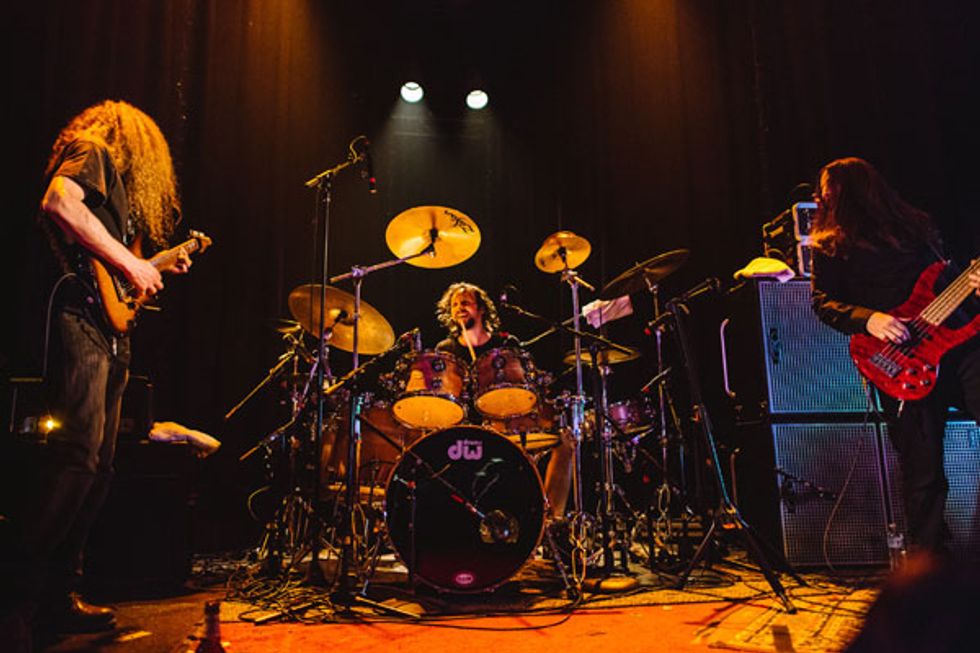
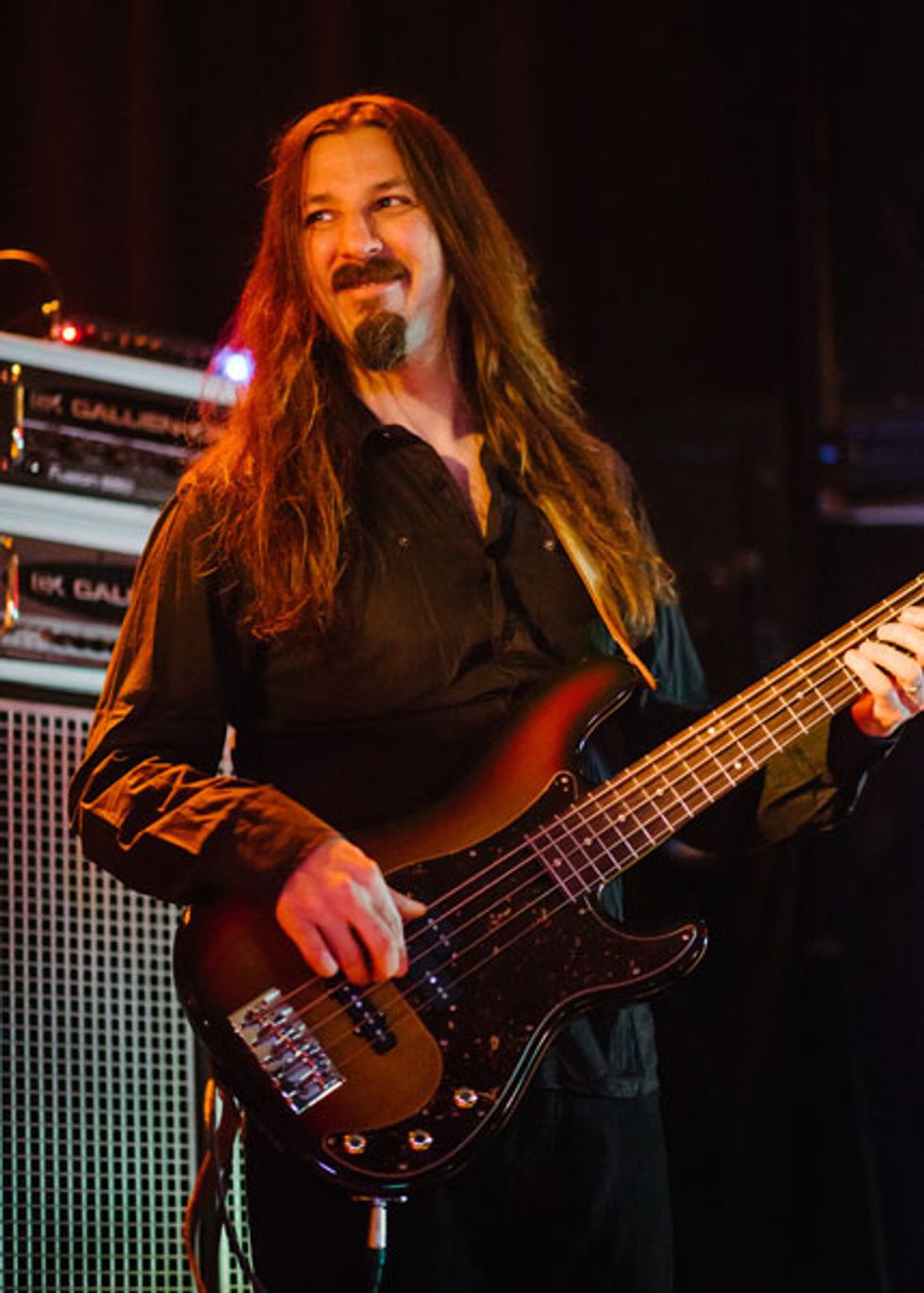





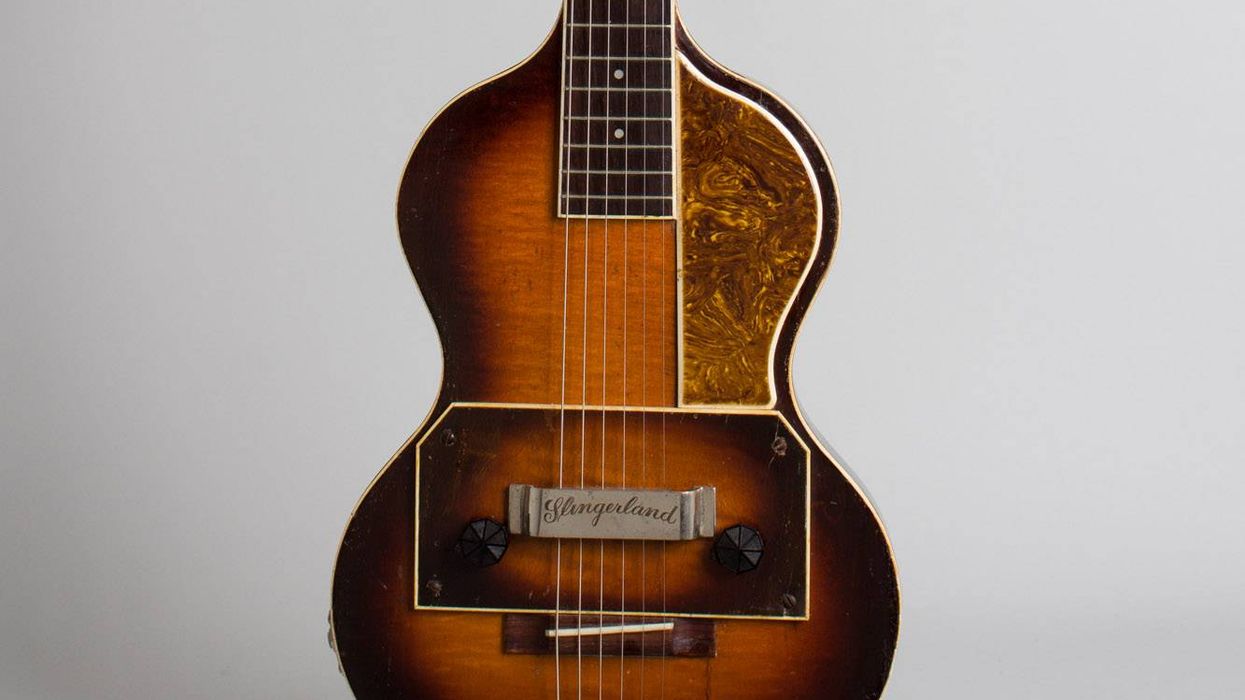
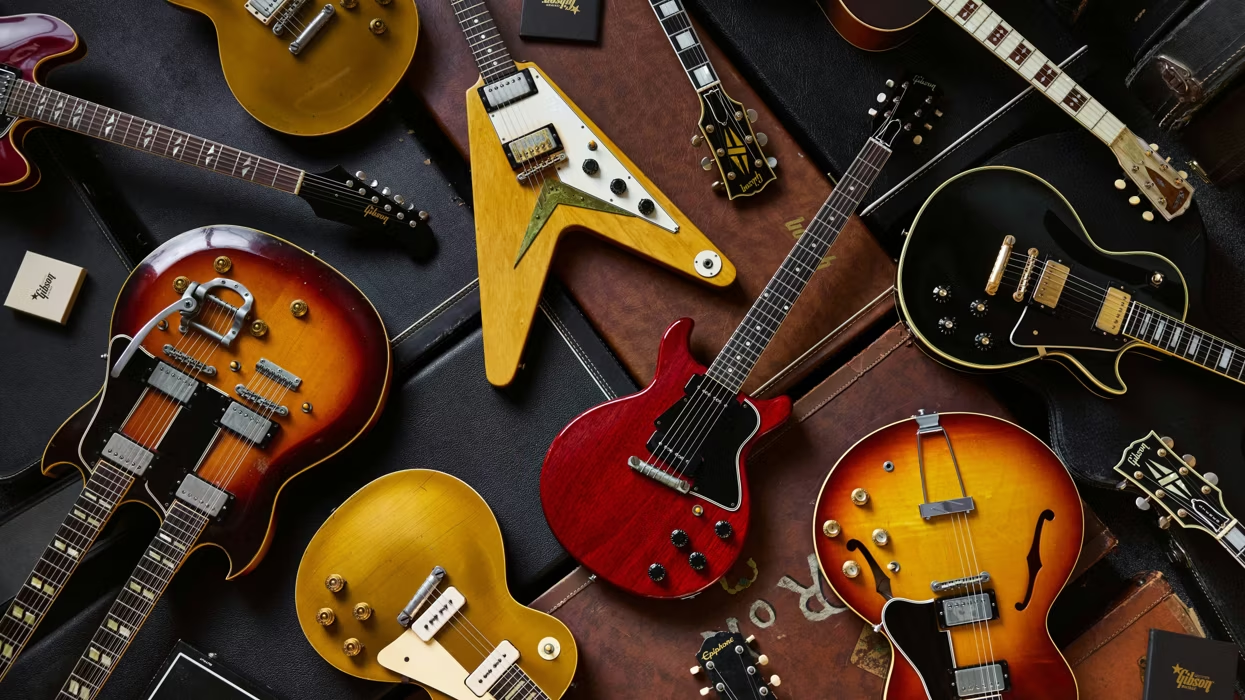

![Rig Rundown: Russian Circles’ Mike Sullivan [2025]](https://www.premierguitar.com/media-library/youtube.jpg?id=62303631&width=1245&height=700&quality=70&coordinates=0%2C0%2C0%2C0)
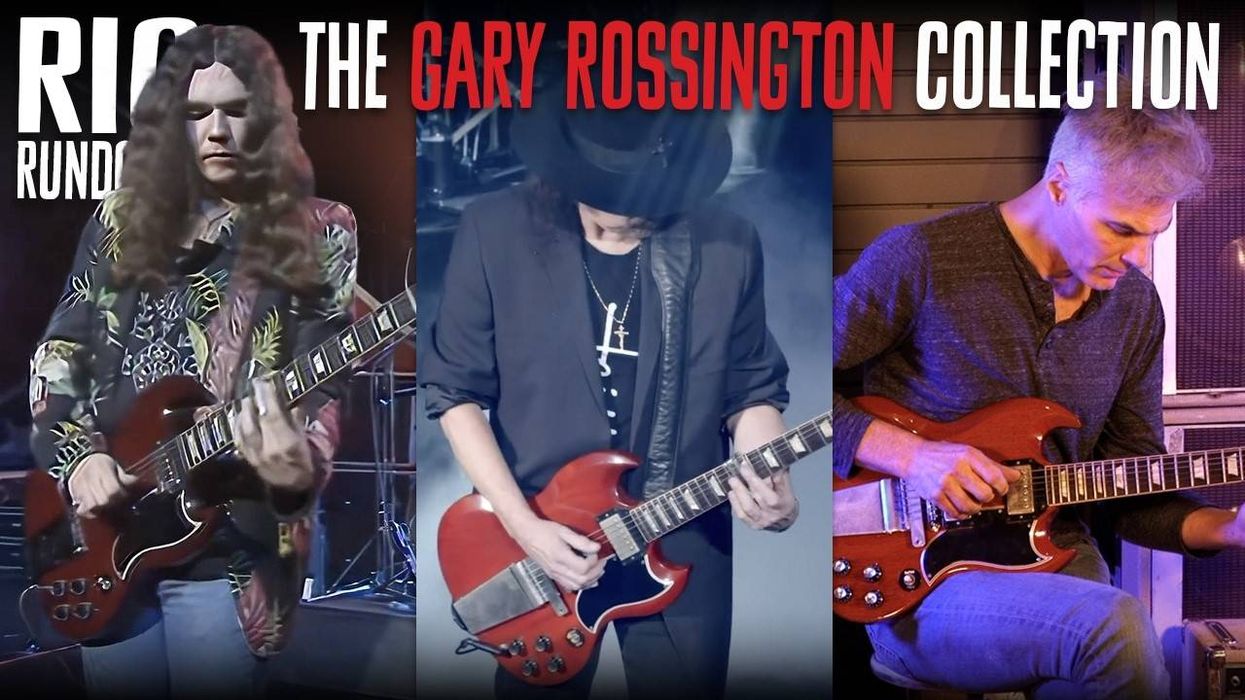











![Rig Rundown: AFI [2025]](https://www.premierguitar.com/media-library/youtube.jpg?id=62064741&width=1245&height=700&quality=70&coordinates=0%2C0%2C0%2C0)




















 Zach loves his Sovtek Mig 60 head, which he plays through a cab he built himself at a pipe-organ shop in Denver. Every glue joint is lined with thin leather for maximum air tightness, and it’s stocked with Celestion G12M Greenback speakers.
Zach loves his Sovtek Mig 60 head, which he plays through a cab he built himself at a pipe-organ shop in Denver. Every glue joint is lined with thin leather for maximum air tightness, and it’s stocked with Celestion G12M Greenback speakers.











